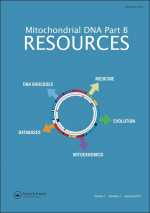The Ecology and Ecosystem Roles of Reef Sharks in the Indian Ocean MPA
Project Overview
Reef sharks continue to be exploited at unsustainable rates despite their important role in coral reef ecosystems. Remote, oceanic coral reefs, such as those within the Chagos Archipelago Marine Protected Area (MPA), represent some of the most biologically diverse environments on the planet. These finely balanced ecosystems support numerous resident and migratory large marine vertebrates of both commercial and conservation importance including tunas, billfishes, reef and pelagic sharks, manta rays, sea birds and sea turtles.
Illegal fishing in the area is still a problem and constitute the biggest threat sharks are facing in the MPA. However, it is emerging that the movement patterns of local reef sharks are predictable between monitoring locations and strongly linked to their vulnerability to illegal fishing activity. This knowledge represents a great opportunity to develop more efficient ways to protect these animals in the Chagos Archipelago MPA and in other remote large marine protected areas of the planet.
This project combines tracking technologies, genetics, fisheries analyses and stable isotope analyses to understand the spatial ecology, conservation status and ecological role of reef sharks in Chagos. It aims to measure the level of connectivity within the archipelago and assess how behaviour and movement make species more or less susceptible to illegal fishing activity. Results will inform management and enforcement strategies of the MPA and help characterize the conservation and management role of large MPA for large marine animals.
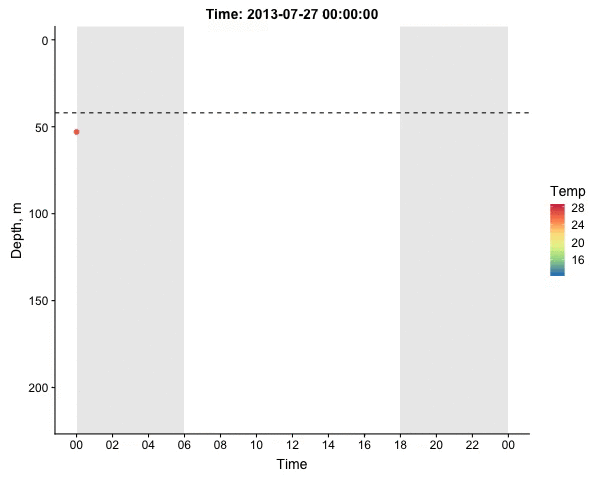
Understanding the ecology and movement of sharks in a human-impacted world is therefore both urgent and essential for their long-term persistence.
Key Facts
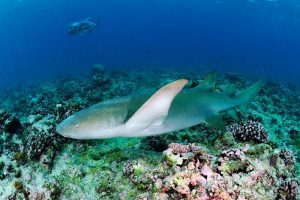
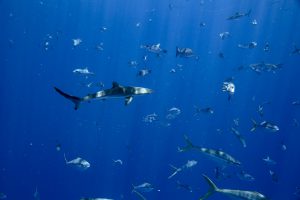
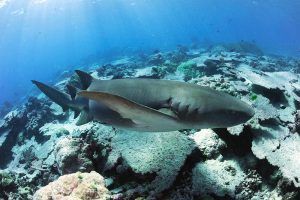
News
Publications

Environmental Stress Reduces Shark Residency to Coral Reefs
Williamson, M., Tebbs, E., Curnick, D., Ferretti, F., Carlisle, A.B., Chapple, T.K., Schallert, R., Tickler, D., Block, B., Jacoby, D. (2024). Environmental stress reduces shark residency to coral reefs. Communications Biology
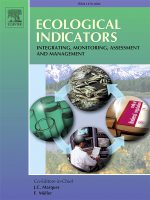
Environmental DNA Helps Reveal Reef Shark Distribution Across a Remote Archipelago
Dunn, N., Curnick, D.J., Carbone, C., Carlisle, A.B., Chapple, T.K., Dowell, R., Ferretti, F., Jacoby, D.M.P., Schallert, R.J., Steyaert, M., Tickler, D.M., Williamson, M.J., Block, B.A., Savolainen, V. (2023). Environmental DNA helps reveal reef shark distribution across a remote archipelago. Ecological Indicators.

The Movement Ecology of Fishes
Cooke, S.J., Bergman, J.N., Twardek, W.M., Piczak, M.L., Casselberry, G.A., Lutek, K., Dahlmo, L.S., Birnie-Gauvin, K., Griffin, L.P., Brownscombe, J.W., Raby, G.D., Standen, E.M., Horodysky, A.Z., Johnsen, S., Danylchuk, A.J., Furey, N.B., Gallagher, A.J., Lédée, E.J.I., Midwood, J.D., Gutowsky, L.F.G., Jacoby, D.M.P., Matley J.K., Lennox, R.J. (2022). The movement ecology of fishes. Biological Reviews.
Emergent research and priorities for shark and ray conservation.
Jorgensen, S.J., Micheli, F., White, T.D., Van Houtan, K.S., Alfaro-Shigueto, J., Andrzejaczek, S., Arnoldi, N.S., Baum, J.K., Block, B., Britten, G.L., Butner, C., Caballero, S., Cardeñosa, D., Chapple, T.K., Clarke, S., Cortés, E., Dulvy, N.K., Fowler, S., Gallagher, A.J., Gilman, E., Godley, B.J., Graham, R.T., Hammerschlag, N., Harry, A.V., Heithaus, M.R., Hutchinson, M., Huveneers, C., Lowe, C.G., Lucifora, L.O., MacKeracher, T., Mangel, J.C., Martins, A.P.B., McCauley, D.J., McClenachan, L., Mull, C., Natanson, L.J., Pauly, D., Pazmiño, D.A., Pistevos, J.C.A., Queiroz, N., Roff, G., Shea, B.D., Simpfendorfer, C.A., Sims, D.W., Ward-Paige, C., Worm, B., Ferretti, F., (2022) Emergent research and priorities for shark and ray conservation. Endangered Species Research.

Social Networks and the Conservation of Fish
Villegas-Ríos, D., Jacoby, D.M.P., Mourier, J. (2022). Social networks and the conservation of fish. Communications Biology.










